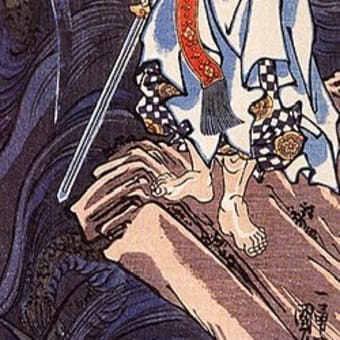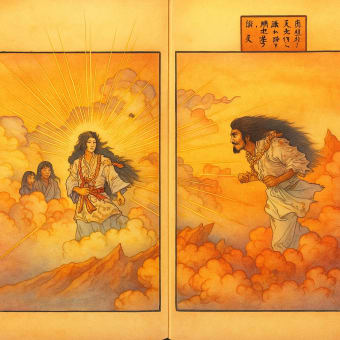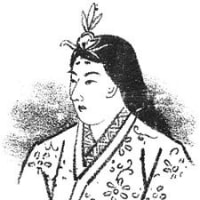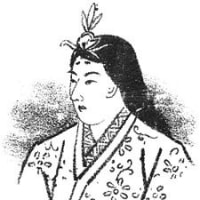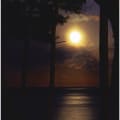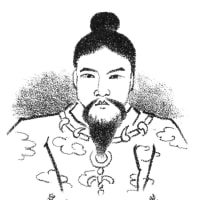『日本書紀』孝徳天皇 11
是月、天皇、御子代離宮。遣使者、詔郡國修營兵庫。蝦夷親附。或本云、壞難波狹屋部邑子代屯倉而起行宮。
二月甲午朔戊申、天皇幸宮東門、使蘇我右大臣詔曰。明神御宇日本倭根子天皇、詔於集侍卿等臣連國造伴造及諸百姓。朕聞、明哲之御民者、懸鍾於闕而觀百姓之憂、作屋於衢而聽路行之謗。雖蒭蕘之說、親問爲師。由是、朕前下詔曰、古之治天下、朝有進善之旌・誹謗之木、所以通治道而來諫者也、皆所以廣詢于下也。
管子曰、黃帝立明堂之議者上觀於賢也、堯有衢室之問者下聽於民也、舜有告善之旌而主不蔽也、禹立建鼓於朝而備訊望也、湯有總術之廷以觀民非也、武王有靈臺之囿而賢者進也。此故、聖帝明王、所以有而勿失、得而勿亡也。所以、懸鍾設匱拜收表人、使憂諫人納表于匱、詔收表人毎旦奏請。朕得奏請、仍示群卿便使勘當。庶無留滯。如群卿等或懈怠不懃・或阿黨比周、朕復不肯聽諫、憂訴之人當可撞鍾。
≪英訳≫
In this month, the Emperor proceeded to the temporary palace at Koshirō no Karimiya (子代離宮). He dispatched envoys and issued an imperial edict to the counties and provinces (郡国), ordering them to construct armories. The Emishi (蝦夷) submitted in allegiance.
According to one account, the government storehouse at Naniwa no Sayabe no Mura (難波狭屋部邑) called Koshirō no Miyake (子代屯倉) was demolished, and a temporary palace (行宮, karimiya) was constructed in its place.
On the 15th day of the second month (二月十五日), the Emperor went out to the eastern gate of the temporary palace and had Soga no Ōomi (蘇我右大臣), the Right Chancellor, deliver the following edict:
“I, the Emperor of Japan who rules under the divine will (明神御宇日本倭根子天皇), now proclaim to the assembled maetsukimi (卿: ministers and nobles), omi (臣), muraji (連), kuninomiyatsuko (国造), tomonomiyatsuko (伴造), and the people:
’I have heard that a wise and enlightened ruler, when governing the people, hangs a bell at the palace gate so that the people may strike it and express their grievances. He builds huts at street corners so that he may hear the criticisms of passersby. Even the words of a humble grass-cutter or woodcutter are personally inquired into and taken as guidance.
Previously, I issued a decree stating: In ancient times, those who ruled the realm placed banners for the encouragement of good words and erected the tree for Public Complaints (slander board) for public criticism.
These were established so that admonitions could be received, and the way of governance improved through widespread consultation from below.
The “Guanzi” (管子) states: The Yellow Emperor (黄帝) established deliberations in the Hall of Brightness (明堂) to observe the wise from above. Emperor Yao (堯) used the kushitsu (衢室 room to listen to the politics built in crossroads) to listen to the voices of the people from below. Emperor Shun (舜) erected a banner to encourage those who would offer good counsel and ruled without obscuring their words. Emperor Yu (禹) placed a drum in the court so that those who had complaints could strike it and be heard. King Tang (湯) established the courtyard of “all teachings” (sōjutsu no tei, 総術之廷) to listen to the criticisms of the people. King Wu (武王) maintained the sacred terrace (reidai no sono, 靈臺之囿) where the wise could come forth and speak. In this way, the sage emperors and enlightened kings ruled justly, losing neither their virtue nor their authority.
Therefore, I too have had a bell hung and a suggestion box (匱, hitsu) set up. I appointed officials in charge of collecting written petitions (収表人). Those with grievances may place their written appeals into the box. Every morning, the collector shall report these to me. I will read them and then present them to the ministers (maetsukimi) for appropriate deliberation. In this way, no matter shall be delayed or neglected.
However, should the ministers show negligence or indifference, or should they conspire in cliques and act unjustly, or if I myself cease to heed admonitions, then those with grievances may strike the bell to make their voices heard.’”
≪この英文の和訳≫
この月、天皇は子代離宮(こしろのかりみや)に行幸(ぎょうこう)された。使者を遣わされ、郡国(こおりくに)に詔(みことのり)して、武器を保管するための兵庫(ひょうこ 武器庫)を築かせられた。蝦夷(えみし)が帰順してきた。
ある本によれば、難波狭屋部邑(なにわのさやべのむら)にあった子代屯倉(こしろのみやけ)を取り壊し、その地に行宮(かりみや)を築かれたという。
二月十五日、天皇は離宮の東門にお出ましになり、右大臣(うだいじん)・蘇我(そが)の大臣(おおおみ)に詔を伝えさせて、次のように仰せられた。
「我は、神のご意志のもとにこの国を治める日本の天皇である。ここに集った卿(まえつきみ)、臣(おみ)、連(むらじ)、国造(くにのみやつこ)、伴造(とものみやつこ)、および万民に告げる。
聡明(そうめい)にして明哲(めいてつ)なる君主は、民を治めるにあたり、宮門に鐘を掛け、それを打たせて民の憂いを聞き、また街角に小屋を建て、道行く者の不平を耳にされたという。草刈りや樵夫(きこり)の言うことであっても親しく問うて手本とされるという。先に詔(みことのり)を出して『古の君が天下を治めるのに、善言を進める者は、道に設けた旗の下で自由に述べさせ、不平を述べたい者は、橋上の木(批判を表明するための木、自由意見掲示板)に勝手に書かせた。これはすべて、諫言(かんげん)を受け入れ、広く下々の意見を聴こうとするためであった』と。
『管子(かんし)』にはこう記されている。黄帝(こうてい)は明堂(めいどう)に議を設け、上より賢者の行いを観た。堯(ぎょう)は衢室(くしつ 辻に造った政を聴く室)において、下より民の声を聴いた。舜(しゅん)は善言を掲げる旗を立てて、主がそれを遮ることなく受けた。禹(う)は朝(ちょう)に鼓(つづみ)を設け、訴えある者にこれを打たせた。湯王は総術の庭(辻に設けた庭)を設けて、民の非難を聞く場とした。武王(ぶおう)は霊台之囿(れいだいのその)を設け、賢者を招きその言を求めた。
このようにして、聖帝明王(ひじりのきみ)は、誤りなき政治を実現されたのである。
ゆえに朕(我)もまた、鐘を掛け、匱(ひつ)を設け、収表人を命じた。訴えを持つ者は、表(ひょう)を書きて匱に納めよ。収表人は毎朝これを取り集めて我に奏上せよ。朕(我)はそれを見、群卿(まえつきみ)に示して対処を命ずる。もって、処置に遅れや滞りなからしめんとする。
もしも群卿が怠けたり、私情に流されたり、また我が諫言を聞き入れぬようなことがあれば、そのときは憂いを訴える者は鐘を打ち鳴らすがよい」
令和7年4月10日(木) 2025



